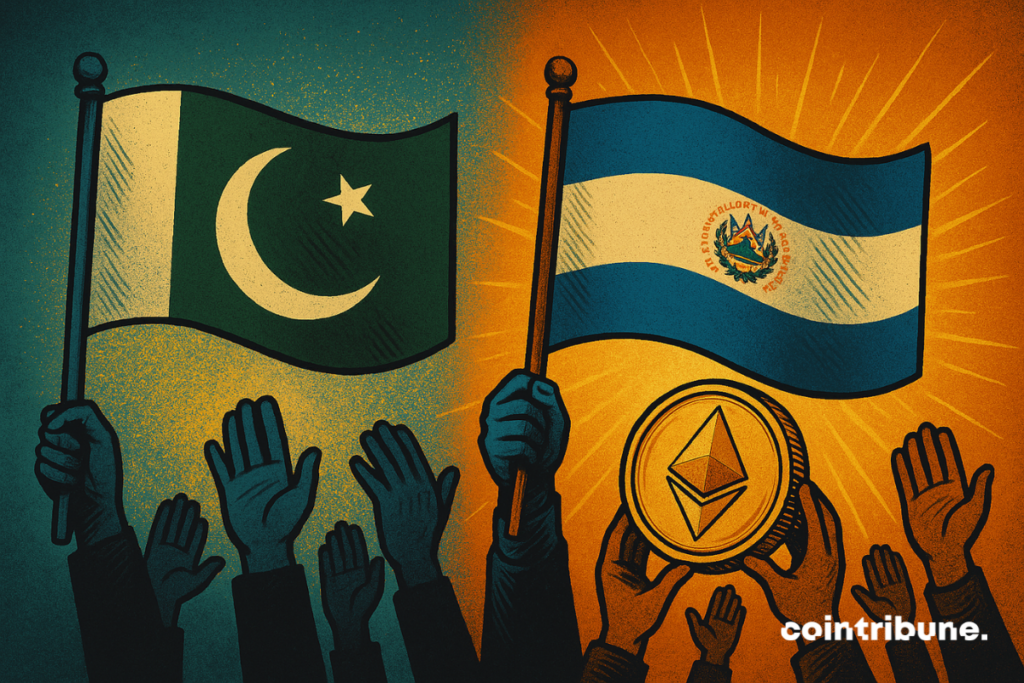Pakistan and El Salvador Forge Historic Crypto Alliance – A New Era of Digital Finance Begins
Two nations leap into the crypto future—whether Wall Street likes it or not.
Pakistan and El Salvador just shook hands on a landmark cryptocurrency partnership, signaling a seismic shift in global finance. Forget slow-moving central banks—these countries are rewriting the rules.
The Bitcoin blueprint goes global
El Salvador brings its hard-won Bitcoin adoption experience to the table, while Pakistan offers a massive unbanked population ripe for crypto disruption. Together, they're building bridges—and possibly giving the IMF an ulcer.
Bankers hate this one weird trick
By teaming up, these nations could create a template for developing economies to bypass traditional financial gatekeepers. Cue the usual suspects warning about 'volatility' while quietly updating their own crypto portfolios.
The partnership proves what crypto maximalists have said all along: when fiat systems fail, blockchain solutions emerge. Now watch as Western regulators scramble to play catch-up—after taking five years to define what a 'digital asset' even is.

In brief
- Pakistan and El Salvador are teaming up on Bitcoin and crypto cooperation.
- Pakistan plans to allocate 2,000 MW for Bitcoin mining and create a national reserve.
- The IMF has raised concerns about the energy impact and regulatory risks of this move.
Bitcoin mining, national reserve plans, and the IMF
This partnership marks a new chapter in crypto’s role on the world stage. For El Salvador, it’s another step in legitimizing its bitcoin strategy. For Pakistan, it shows a shift toward embracing blockchain infrastructure, despite pressure from international institutions.
Pakistan has big ambitions. The country plans to allocate 2,000 megawatts of electricity toward Bitcoin mining and set up a national Bitcoin reserve. But it needs the IMF’s approval. Pakistan is currently under a $7 billion IMF program that runs through 2027, and any major changes in energy policy require greenlighting from the Fund.
https://twitter.com/bitcoinofficesv/status/1945541123792875995The IMF has voiced concerns about market distortion, particularly if crypto miners receive subsidized electricity. Pakistan’s power grid often runs with surplus capacity, especially in winter, but offering preferential rates could disrupt supply-demand dynamics and strain existing infrastructure.
Despite the pushback, crypto is booming domestically. Between 15 and 20 million Pakistanis already hold cryptocurrencies, according to Saqib.
BTCUSDT chart by TradingViewPakistan’s regulatory pivot
To bring structure to this growing market, Pakistan launched the Pakistan VIRTUAL Assets Regulatory Authority in July 2025. This partnership is tasked with licensing and overseeing exchanges, stablecoins, wallets, and other digital asset services.
This follows an April 2025 Letter of Intent between the Pakistan Crypto Council and Trump-backed World Liberty Financial. That agreement aims to fast-track blockchain adoption through regulatory sandboxes and stablecoin pilots.
What’s next?
Both countries face hurdles. El Salvador is still navigating IMF restrictions on new Bitcoin purchases. Yet it holds over 6,000 BTC, worth around $745 million, and remains committed to its crypto-first vision. Pakistan, meanwhile, must juggle crypto ambitions with economic recovery and tight fiscal oversight. The IMF estimates it will need over $100 billion in external funding by 2029. Still, the meeting between Saqib and Bukele shows how digital assets are supporting international alliances.
Maximize your Cointribune experience with our "Read to Earn" program! For every article you read, earn points and access exclusive rewards. Sign up now and start earning benefits.

